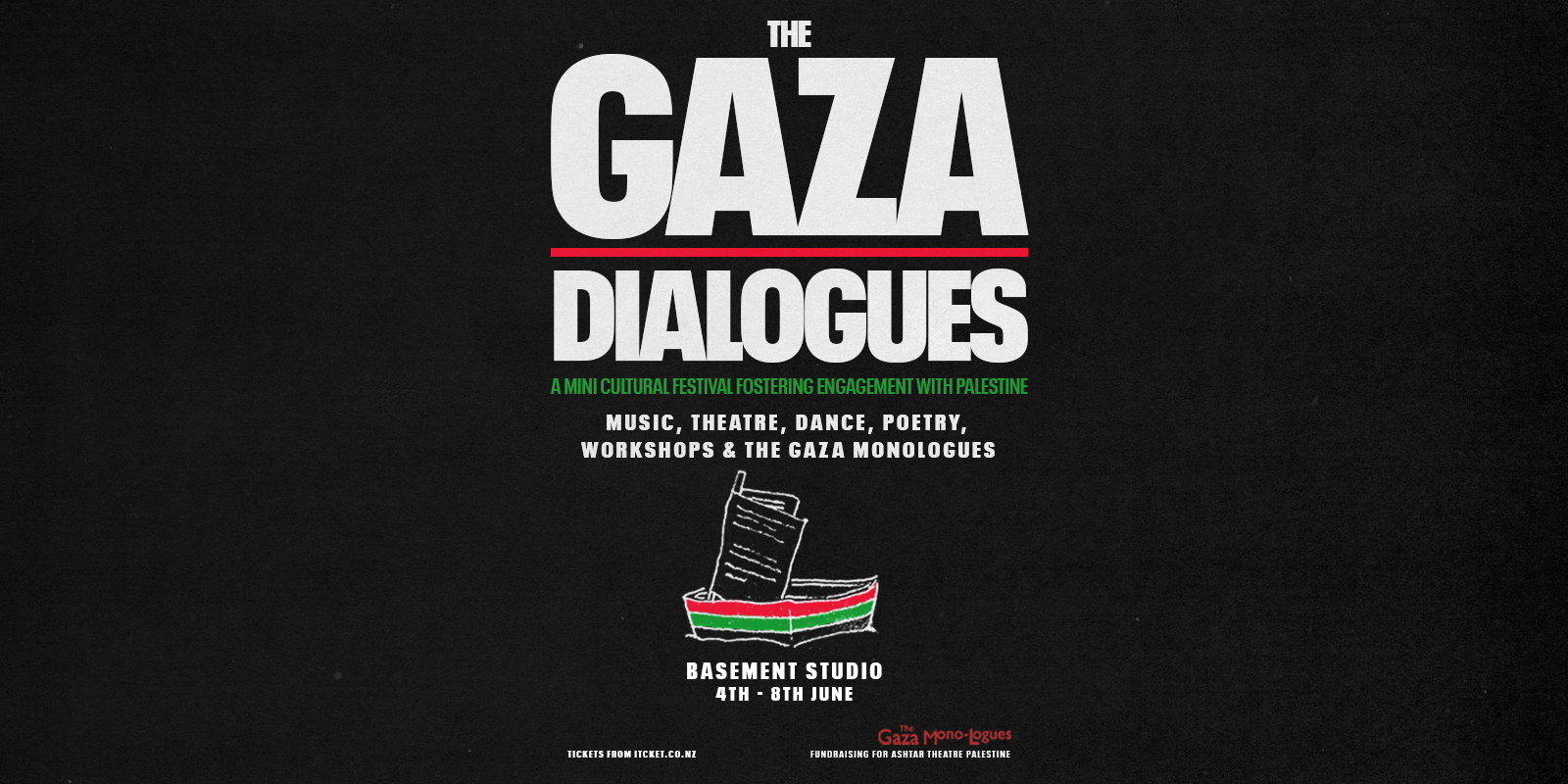It’s already busy at Basement when I arrive, just after 4:00 pm, to speak with Hone Taukiri. The door to the bar is open in the afternoon light; I pass event organisers setting up trestle tables under a marquee outside, clad in keffiyehs and the colours of the Palestinian flag, and overhear attendees of the evening’s poetry workshop being directed up into the Studio. Tonight marks the fourth sold-out evening of The Gaza Dialogues.
It’s a hub of activity in these preceding hours. Taukiri—alongside Rand Hazou, Reb Fountain, Nicholas Rowe, Rahman Bashir, and Acacia O’Connor—is one of the festival’s core organisers. His phone goes off as we say our first hello in the bar, and he apologises, and asks if it’s alright, before stepping away to take the call. Upon his return, we head upstairs to the green room. Music, and the hum of conversation, glides through the open doors that link this space to the Studio; there’s a ready thoroughfare of people, and sound, between them. Taukiri and I settle in on the couch as careful preparation for the workshop, and the subsequent evening performance, continues around us.
TF: This kaupapa, The Gaza Dialogues, stems from ASHTAR Theatre’s The Gaza Monologues, which were written and performed by the company in Palestine in 2010. Proceeds from this festival are being sent to ASHTAR Theatre as well. Can you tell us about the mahi they do in Palestine?
HT: Yeah, absolutely. ASHTAR Theatre is the longest-running youth theatre company in the West Bank. They’ve done a lot over that period of time—I think they’ve been going for about 31 years—but yeah, they did The Gaza Monologues in 2010, in response to Israeli attacks that had happened in 2008. What the proceeds from this festival, The Gaza Dialogues, will be doing is they’ll be going to support ASHTAR Theatre’s psycho-social intervention programme, which is a programme they have where they use theatre techniques and theatre training, in partnership with psychology. They have professional psychologists and therapists, and they basically help people in occupied Palestine deal with the trauma of the occupation—the attacks on Gaza. They are doing this work in the West Bank, but they’re also doing it in the Gaza Strip right now, even as the attacks are going on.
TF: The Gaza Monologues was also read last year at the University of Auckland, following an urgent call from ASHTAR Theatre to friends and theatremakers across the world. Is there a continuity between that reading and the development of this festival?
HT: Definitely—a lot of the people who were involved in putting up The Gaza Monologues at the University of Auckland are also involved again with this project. This project, The Gaza Dialogues, goes a little bit wider, so we have a different thing every night. We opened with an abridged version of The Gaza Monologues—so, it has 31 monologues usually, but we did 15. That was organised by Rand Hazou, who is a theatre lecturer and professor and also a Palestinian theatremaker.
Some of the other people who were involved with reading and organising The Gaza Monologues originally—we had Reb Fountain, we had Nicholas Rowe—they’ve kind of stepped into their own fields, so to speak. Reb Fountain did the music night [The Gaza Music Dialogues], where we had musicians coming together and singing, and also singing Palestinian songs. And Nicholas Rowe, who is a Professor of Dance Studies at the University of Auckland—he also did his PhD in Palestinian dance, and lived in Palestine for more than eight years. He organised the dance evening we had [The Gaza Dance Dialogues]; we had a workshop for people in dabke, which was performed on stage. We also had different art forms like queer dance forms, waacking, some contemporary stuff, performance art pieces as well. So it’s The Gaza Monologues, and a bit extra.
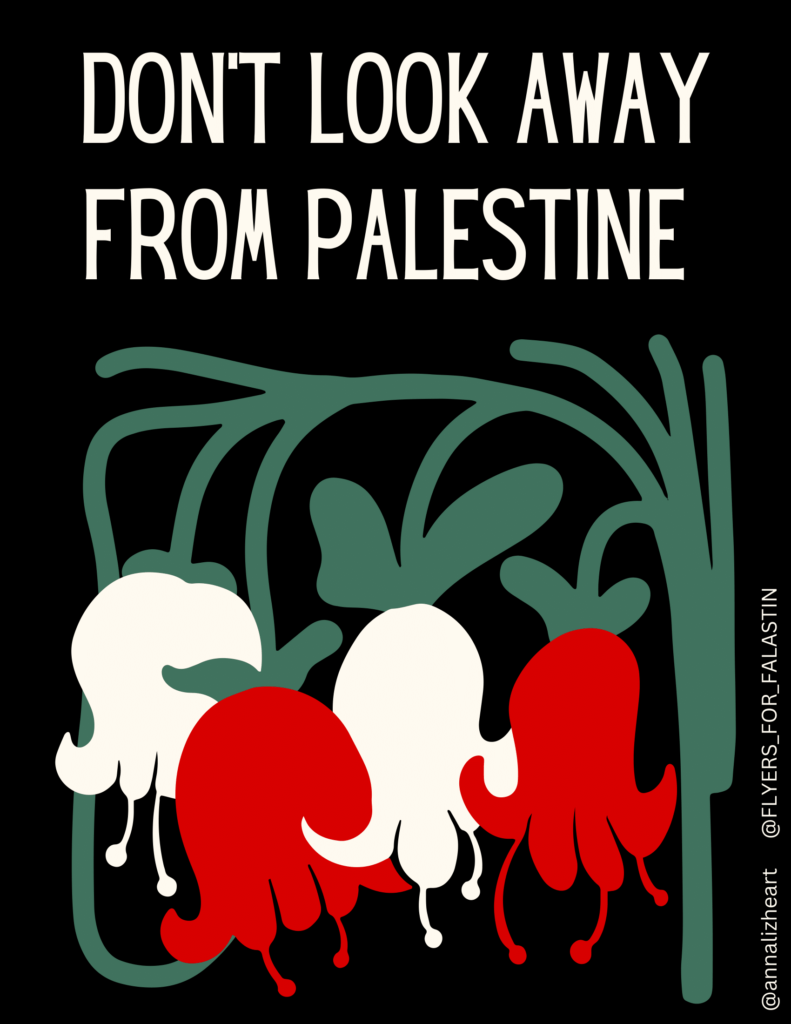
TF: How, in that process of it growing and expanding, did you go about curating the festival and assembling the team and all of the artists who are involved?
HT: The process was kind of straightforward, in that we just kind of worked with what we knew. How I met Rand was, I just met him at a protest; I met him at a rally at Britomart Square. And he gave this speech—he held up a spoon. And he was all like, ‘Do you know what this is?’ And I was like, ‘I know the answer to this!’ and I yelled real loud, I was like, ‘A spoon!’ And then he went, ‘It’s not just a spoon!’ And I was like, bummed out, but then he was like, ‘Six Palestinian prisoners dug their way out of jail using spoons and escaped. This is a symbol of Palestinian resistance!’
And he was introduced as being a theatremaker. Because just the day before, we had acquired the use of the Basement for the five days to do this festival, I didn’t really know how I was gonna get things together—
[There’s a pause here, as other festival personnel pass through the green room, dropping off bags and other belongings. Taukiri takes a moment.]
HT: But yeah, we just happened to meet each other there, and then he introduced me to Nicholas and Reb, and so I think between the few of us that are involved it’s a really wide network of artists that we’re able to reach, especially in Aotearoa where it’s a small circle, really, of creatives—and most people are doing more than one thing.
TF: You’ve also interwoven several opportunities for community participation, having people join in the dancing on Thursday night, and the poetry workshop that’s going on right now [Friday afternoon]. Was that driven by the desire to get audiences creatively engaged with Palestine in a tangible way?
HT: It was driven by a desire to—yeah, definitely—get audiences engaging with Palestine in a creative way. I think a lot of the images we’re being exposed to at the moment are images of horror, and people suffering, and people living in famine and destitution, and I think for people to just see the faces of Palestinians around them, doing things that they do—it gives that broader picture of humanity. You know, I think it can be very—you can minimise who a people are if you’re only ever seeing them through a phone, and a couple of pictures.
But it was also very important for us to have the Palestinian community in Tāmaki involved with the festival itself. Not only making sure that Palestinians came, to take part in the arts and to feel some of the relief that the arts can bring, but also having the Palestinian art forms given visibility, too, and giving a space for Palestinian people to speak about their culture, and their stories, and what things mean, is really important. Because I think there’s a lot of activism happening in the country from a lot of different spaces, but it’s really important to keep the people who this is about at the front of that.
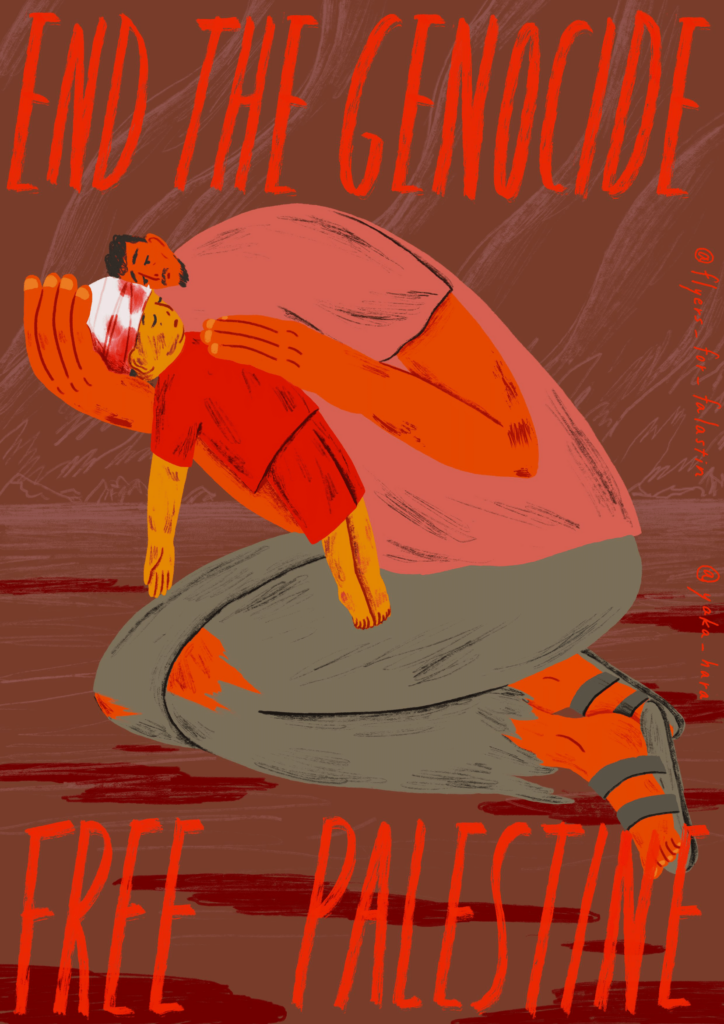
TF: As we’re speaking, you’re mid-festival. What have been some particular highlights or standout memories in delivering The Gaza Dialogues this week?
HT: Gosh. The workshops have really stood out for me—the learning spaces. There have been so many great images from there of people connecting, and people meeting each other, from all types of different places and backgrounds and experiences of life, and relationships to what’s going on in Palestine. It’s been really cool to see the fruit of that, I think, because I’m interested in arts communities and festivals as a second space, for protesters, outside of just the rallies. I think, at the rallies, we go, and we march, and we yell, and there’s not heaps of socialising that happens. And the great thing about socialising is—it’s a chance for people with skills to meet other people with ideas, and for that to grow into new possibilities for action to be taken.
TF: And am I right in thinking that The Gaza Dialogues sold out before it opened? Is that right?
HT: That’s right!
TF: Yeah! That’s awesome! I’ve been speaking to people who have attended previous evenings, and I’ve heard that each night has been full, and that you’ve been running a waitlist for people to get in. What do you take from this phenomenal response?
HT: Y’know, the first thing that comes to mind is people need to book their tickets earlier— [He laughs.] You know? Stop emailing me the night before; I’ve been posting about this for weeks!
But another thing I think is that people are looking for more ways to engage. People care; people are really affected, and devastated, by what is going on, and there needs to be places where people can go that they can engage with the culture of Palestine and what it means to be Palestinian in a way that isn’t completely horrifying. Not that I’m suggesting that people should be in denial, or ignore what’s going on, but I think that resistance can look like many things. And one thing resistance can look like is singing; it can look like dancing; it can look like people sharing food. It can look like people being in the same space as each other.
TF: I saw in the Basement write-up about the festival that part of this ‘has come as a request to remember that Palestinians aren’t just trying to survive the horrors they are currently facing, but also to thrive and continue to make art’—and so engaging in this way can be a meaningful step towards that as well, and a reminder of that.
HT: Definitely. I mean, I believe that this genocide that is going on will come to an end, and when that happens, we have to then turn ourselves to how we’re going to live. How are we going to live? What’s going to be the food for our soul? I think this is attempting to provide an answer to that.
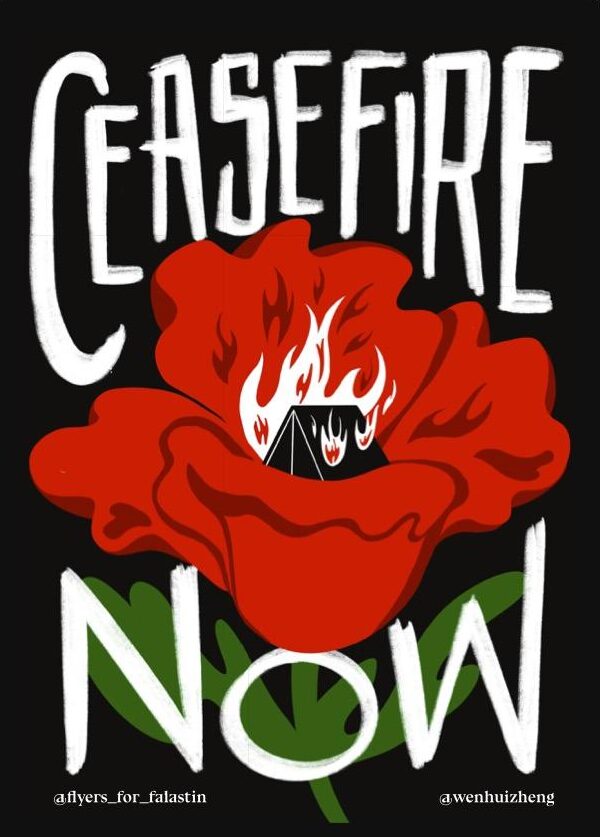
TF: What’s next for The Gaza Dialogues?
HT: We have big dreams for this festival. Lots of festivals are annual or biannual—I think, with the urgency of what’s going on at the moment, I’d like to have festivals like this as often as we can. We’ve been able to arrange this festival in a relatively short time, because we’ve had lots of people working together, making this happen, so what I’d like to see in the future is even more people coming together to make more things happen. I’d like to do another festival in November, maybe, that has multiple venues, different workshops, bringing in even more of the Palestinian community who couldn’t come this time. And because this was short notice, a lot of the stuff, we just whipped up, y’know—we’re doing play readings, but we’re not staging full plays. But maybe in the future, if we had more time and resources, it would be great to take some of these plays we’re reading, and stage them fully, with all the bells and whistles.
TF: And is there the possibility of taking this kaupapa beyond Tāmaki Makaurau? Would there be elsewhere across Aotearoa that you’d like to take the festival?
HT: Yeah, I’d love to do that. We’ve had some Instagram comments of people asking, like, ‘Is this going to come to Christchurch?’ or asking if we’re going to bring it to other places, so I feel like the interest is there from the rest of Aotearoa to be holding these festivals. I know that protests have been going on in different towns all across the nation, so if protests are happening everywhere, then the festival should be happening everywhere as well. And I’d love to collaborate more with ASHTAR Theatre, and maybe bring them over to do some stuff, or go visit them in the West Bank, and just build that relationship.
TF: If people have attended the festival, and they feel inspired, and want to continue to engage with Palestinian art and in solidarity with Palestine, what would your suggestions be for them?
HT: At the moment, in Auckland, I think if people want to engage with Palestinian art, it’s not as straightforward as I would like to say. Like, I wish I had a really straightforward answer of ‘Oh, you can take this class, or you can go see this and that.’ Unfortunately, it’s not as easy as that, and that’s a big reason why we have put this festival on in the first place. One of the goals was to be a spark of further creative expansion for Palestinian art. And so what I hope is that people will come away from the festival, will have a strong interest in learning these art forms [. . .]. If people really want an immediate thing, I think they should follow the artists on Instagram—like Rana, who is a Palestinian singer, who’s come to many nights of The Gaza Dialogues—and they should just DM them and start requesting—start requesting lessons.
TF: There’s so much Palestinian writing and so much Palestinian art out there as well, so it is just a question of going and looking for it.
HT: And the artists that I’ve spoken to have such an enthusiasm to talk about it and to share it with people, so the willingness is there to give, I think. Once they know the willingness is there to receive, then it’ll just be like opening the floodgates.
Overall, it would be great to get people speaking up about Palestine and showing that interest. Because, I think—I spend a lot of time in the space of activism and arts and so on, where people have been fairly vocal about it, but overall, the New Zealand public is still very quiet on what’s happening, with the genocide in Palestine, and so I think maybe the Palestinian community doesn’t feel as willing to open up as they might if the public were far more responsive. I would urge people to speak about Palestine, because when people speak, public opinion changes, and when public opinion changes, that’s when everything changes, really. People can’t get away with racism and discrimination and silence and things like that for very long if the whole world is openly opposed to it.
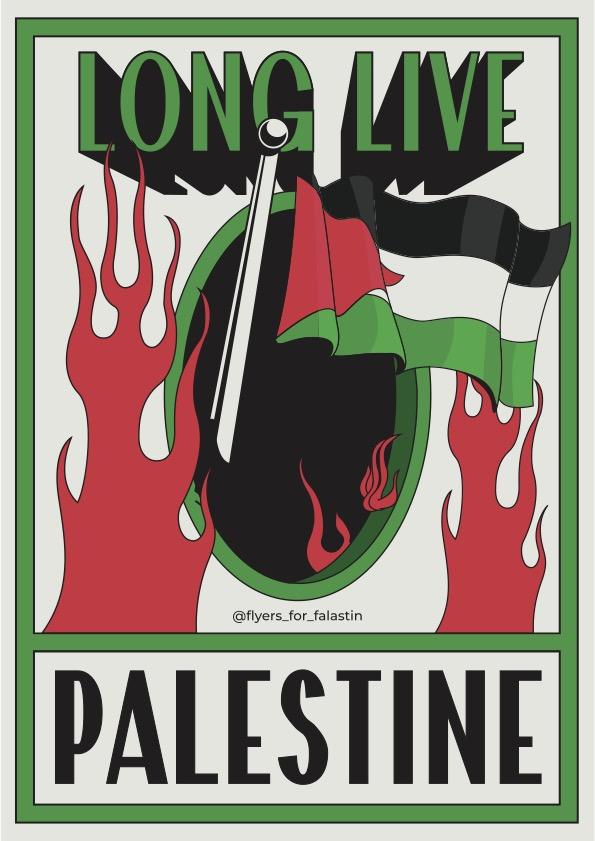
TF: Before we close, is there anything else you’d like to say, or to share?
HT: Sure—yeah. You know, in the time leading up to the festival, I’ve had some pretty dark moments, emotionally, thinking about what is happening, and the people who are being affected, and the powers that are allowing this to go on and encouraging it. And all this week, I’ve felt great. I’ve felt great. I’ve felt great and I’ve felt moved to act at the same time. So I’d encourage people—a healthy relationship with the arts is like a tool for change. I guess what I’m trying to say is it’s not necessary for us to always be tearing ourselves apart in order to create change; we can feel joyous and we can feel connected, and we can feel safe, and we can still achieve the same results, if not more.
Resources
ASHTAR Theatre is a non-profit organisation, established in Jerusalem in 1991 as the first theatre training organisation for youth in Palestine. You can donate to their psycho-social relief intervention campaign here.
Palestine Solidarity Network Aotearoa (and its regional branches) campaign for a free Palestine. They have a vast collection of valuable resources on their website and you can follow their Instagram for updates and to find a regional branch.
Boycott Zine (created by Pinky and Laura in Pōneke), is an “Aotearoa-based pocket zine to help you boycott brands linked to Israel’s genocide in Gaza”.
Halal Kiwi is a smartphone application and website that allows you to search consumer items and brands to see if they are connected to Israel and complicit in its genocidal actions.

